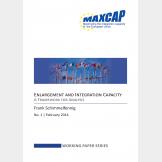We are happy to announce the launch of the MAXCAP Working Paper Series. The series starts with a paper written by Frank Schimmelfennig which conceptualizes “integration capacity” and develops a dynamic model of enlargement in order to provide a basic framework for analysis for our research project. You can download the Working Paper here.
Based on the EU policy debate on integration capacity, the paper distinguishes internal and external integration capacity. Internal capacity denotes the preparedness of the EU to enlarge; external capacity refers to the preparedness of nonmembers to integrate with the EU. The major components of internal integration capacity are policy-making capacity (decision-making capacity, implementation capacity, and financial stability), public support, and institutional reform; external integration capacity is based on democracy, good governance, economic capacity, regulatory alignment, and public support in the nonmember states. Both internal and external integration capacity are the major supply factors for enlargement, understood as a gradual process of horizontal integration. The paper then theorizes the factors that affect internal and external integration capacity and their impact on enlargement. Veto players and weak state capabilities are the major domestic obstacles in the nonmember states, which can, however, be compensated by EU capabilities, the ability of the EU to build transnational coalitions, and an effective negotiation design. Internal integration capacity improves the EU’s ability to help nonmember countries prepare for closer integration. Finally, the paper theorizes positive and negative feedback effects from one enlargement to another.
It is the objective of the MAXCAP Working Paper Series to disseminate the research results of the research consortium to a wide audience, including the academia as well as the general public. Thus, all Working Papers can be downloaded free of charge from our website.


